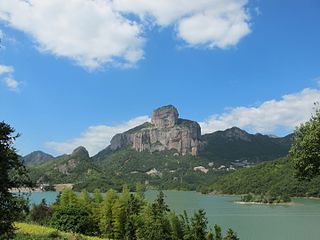 W
WWu refers to a region in China centered on Lake Tai in Jiangnan. The Wu region was historically part of the ancient Yang Province in southeastern China. The name "Wu" came from the names of several historical kingdoms based in that area.
 W
WJiangnan or Jiang Nan is a geographic area in China referring to lands immediately to the south of the lower reaches of the Yangtze River, including the southern part of its delta. The region encompasses the city of Shanghai, the southern part of Jiangsu Province, the southeastern part of Anhui Province, the northern part of Jiangxi Province and the northern part of Zhejiang Province. The most important cities in the area include Anqing, Changzhou, Hangzhou, Nanjing, Ningbo, Shaoxing, Suzhou, Wuxi, Wenzhou, and Zhenjiang.
 W
WShanghai is one of the four direct-administered municipalities of the People's Republic of China. It is under the direct administration of the State Council of China. The city is located on the southern estuary of the Yangtze, with the Huangpu River flowing through it. With a population of 24.28 million as of 2019, it is the most populous urban area in China and the third most populous city proper in the world. Shanghai is a global center for finance, research, technology, manufacturing, and transportation, and the Port of Shanghai is the world's busiest container port.
 W
WWu (222–280), commonly known as Dong Wu or Sun Wu, was one of the three major states that competed for supremacy over China in the Three Kingdoms period (220–280). It previously existed from 220–222 as a vassal kingdom nominally under Cao Wei, its rival state, but declared independence from Wei and became a sovereign state in 222. It became an empire in 229 after its founding ruler, Sun Quan, declared himself emperor. Its name was derived from the place it was based in — the Jiangnan region, which was also historically known as "Wu". It was referred to as "Dong Wu" or "Sun Wu" by historians to distinguish it from other Chinese historical states with similar names which were also located in that region, such as the Wu state in the Spring and Autumn period and the Wuyue kingdom in the Five Dynasties and Ten Kingdoms period. It was called "Eastern Wu" because it occupied most of eastern China in the Three Kingdoms period, and "Sun Wu" because the family name of its rulers was "Sun". During its existence, Wu's capital was at Jianye, but at times it was also at Wuchang.
 W
WWu (吳), also referred to as Huainan (淮南), Hongnong (弘農), Southern Wu (南吳), or Yang Wu (楊吳), was one of the Ten Kingdoms in eastern China which was in existence from 907 to 937. Its capital was Jiangdu Municipality (江都).
 W
WWuyue, 907–978, was an independent coastal kingdom founded during the Five Dynasties and Ten Kingdoms period (907–960) of Chinese history. It was ruled by the Qian family, whose family name remains widespread in the kingdom's former territory.
 W
WZhejiang is an eastern, coastal province of the People's Republic of China. Its capital and largest city is Hangzhou. Zhejiang is bordered by Jiangsu and Shanghai to the north, Anhui to the northwest, Jiangxi to the west and Fujian to the south. To the east is the East China Sea, beyond which lies the Ryukyu Islands. The population of Zhejiang stands at 57 million, the 10th highest among China. Other notable cities include Ningbo and Wenzhou. It has been called 'the backbone of China' due to being a major driving force in the Chinese economy and being the birthplace of several notable persons, including the Chinese Nationalist leader Chiang Kai-shek and entrepreneur Jack Ma.